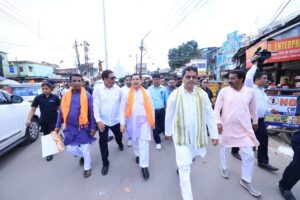Tripura CM Manik Saha praises new GST reforms, highlighting benefits for buyers and sellers. The simplified tax system reduces prices, strengthens the economy, and spreads public happiness, marking a significant step toward India’s goal of becoming a global economic leader.
Tripura Chief Minister Manik Saha on Wednesday highlighted the widespread appreciation for the newly implemented GST (Goods and Services Tax) reforms, stating that both buyers and sellers are experiencing tangible benefits. The Chief Minister’s remarks came during his participation in a campaign promoting the GST reforms at Maharajganj Market, Tripura’s primary commercial hub.
Speaking to traders and shoppers, Saha emphasized the impact of the reforms on reducing the prices of essential goods, leading to a positive response from the public. “People are thanking Prime Minister Narendra Modi for the reduction in the prices of goods, especially basic and essential items,” he said.
Saha explained that the reforms, effective from September 22, were initiated under the guidance of Prime Minister Modi and announced by Union Finance Minister Nirmala Sitharaman. He remarked that the reforms mark a significant step toward strengthening India’s economic foundation and ensuring that benefits reach every section of society, from consumers to business owners.

“Today, I visited Maharajganj Market, the largest in the state, to assess the implementation of the new system. I spoke to both traders and buyers and observed their reactions to the work done by the Prime Minister. It was evident that there was a happy atmosphere due to the reduction in prices. People expressed their gratitude to the Prime Minister,” Saha stated.
The Chief Minister recalled the complex tax system that existed prior to GST. “Earlier, there were multiple taxes. Goods leaving factories attracted taxes, including road tax, VAT (Value Added Tax), and additional taxes when transported across states. When these were combined, GST was introduced. Initially, it created a lot of confusion,” he said.
He further noted that the GST system has now been simplified from five slabs to just two, a move that has eased compliance for traders and reduced costs for consumers. “When Prime Minister Narendra Modi initiated the reform, some opposition voices claimed it would ruin the economy. However, the results speak for themselves,” Saha added.
He highlighted India’s rising economic stature, mentioning that the country has moved from 11th to 4th place globally in terms of economic strength. The Chief Minister also underscored the long-term vision of building a ‘Viksit Bharat’ by 2047, with the potential for India to emerge as the best economy globally by 2050 or beyond.
Saha also stressed the importance of the GST reforms in fostering inclusive growth. “By rationalizing GST rates, the government under Prime Minister Modi has taken a transformative step that strengthens the economic foundation of the country. From ordinary citizens to business owners, everyone benefits,” he said.
The campaign in Agartala covered not only Maharajganj Market but also Kaman Choumuhani and the Smart Market, highlighting the government’s efforts to create awareness about the reforms. Traders and buyers expressed excitement and described the reduced tax rates as a timely gift, especially in the run-up to upcoming festivals.
Social media responses from local figures echoed the Chief Minister’s observations. Tinku Roy, a prominent observer in Agartala, noted: “The wave of happiness around the #NextGenGST reforms is visible among traders and customers. Ahead of the festive season, this is indeed a real gift for every household. Today, with the presence of Tripura’s CM Dr. Manik Saha, we observed the positive impact firsthand at Maharajganj Market.”
| Also Read: Smart Meters in Tripura to Eliminate Billing Errors: Power Minister |
With these reforms, Tripura is witnessing a practical demonstration of how policy reforms at the national level can directly benefit citizens at the grassroots, reinforcing the government’s vision for a stronger, more inclusive economy.












